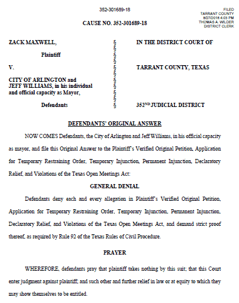The City Council scuttles their rule-bending shenanigans.
In mid-August, Norred Law agreed to represent Zack Maxwell in Maxwell v. City of Arlington, et al., Cause No. 352-301689-18, and obtained a restraining order to prevent the City of Arlington from using illegal gamesmanship to win its fight against term limits.
The City Council planned on setting aside two rules, allowing meetings on consecutive days and dispensing with the usual rule requiring one of the two readings to be a regular meeting. When the Council gave notice of two special meetings on Sunday and Monday to approve the additional ballot option, even supporters of the City Council recognized that this approach to defeating the petition measure smelled really bad to most people and might well ensure passage of the stronger term limits. Anger over this might spill over onto other elections, potentially jeopardizing the JPS bond election.
The resulting 0-9 vote on Sunday evening by the Council was a surprising breath of fresh air, as the Council decided to refrain from taking this trust-destroying path, and to simply oppose the current term-limit measure. The Council then held its Monday night meeting and voted on the original term-limit ballot language. As the deadline to make ballot changes was August 20, 2018, the restraining order was no longer necessary and there was no further real danger of the Council doing something crazy, so we cancelled the hearing on a continued temporary injunction.
So why is this case still alive?
The City Council has answered the lawsuit with a general denial. In the legal world, this is a short pleading that says, “I deny everything that you say. Prove your case.”
What the City did not say is, “Well, we may have been wrong in this instance but we won’t do it again.” Instead – the City is saying that it was right to do what it did, and may do it in the future.
To be fair, a general denial is often the first thing that a defendant files when responding to a lawsuit, and though it legally means opposition in every aspect, one can read too much into such a mundane pleading. At least the City didn’t try to argue sovereign immunity or some other dilatory affirmative defense.
Maxwell dismissed his claims against Mayor Jeff Williams last week, since the deadline to make any new changes to the upcoming election passed on August 20, and there is no longer a need for a temporary restraining order against him individually.
We discussed the case with opposing counsel in an attempt to settle this and move along. We asked for attorney fees and a simple agreed judgment in the form of a declaration that the City recognizes that an agenda item title should refer to one subject and that new subjects cannot be added between first and second readings. Our settlement demand was $16,000 for attorney fees, which is the amount of time that our office actually put into the effort thus far, and that’s it. Maxwell has demanded no damages at all if we could settle promptly.
The Counsel has rejected this idea, stating that it is not going to admit to any wrongdoing. The Council wants to say that it can use a vague title like “Ordering a November 6, 2018 Special Election” to describe a single subject on a first reading and then use the vagueness of that title to add all manner of other items to a special election that have never been discussed before.
I mused about whether to provide this level of detail in an update on an ongoing case in such an open forum, but this approach seemed necessary because the rumor mill has turned up some strange ideas that need to be squelched, including an assertion that the plaintiff is refusing to settle because he wants $100k.
The rumor may come from paragraph 2.1 of the lawsuit, which includes a statement that the plaintiff seeks non-monetary relief (an injunction) and up to $100,000 in monetary relief. This statement is required under Rule 47 of the Texas Rules of Civil Procedure; every lawsuit has to have a jurisdictional statement that looks something like this. You can read Rule 47 and see that we picked the lowest range. That does not mean that Maxwell is demanding $100,000 in damages, and anyone telling you that is either lying or ignorant of legal proceedings (or both). Understand this - Maxwell has demanded zero damages in settlement discussions.
But why not just dismiss and move along?
There might be those who say, “Hey guys, you won. Why continue, as you know that the City’s not going to do this again, right? Just dismiss it and let’s go on our way.”
This case is not simply going to be dismissed because I’ve been taught by people like this in a similar suit that it’s a bad idea that falls under the rubric of "no good deed goes unpunished'. The tale is worth the telling here.
In 2014, Norred Law represented the “Vote No” side in a suit against Arlington ISD, filed because AISD bond proponents were planning a rally on school grounds. When we filed a simple suit to stop this plainly illegal event, AISD filed a general denial with a claimed First Amendment right to allow and host the rally at Arlington High School. (FYI - the First Amendment does not protect a school district's 'right' to electioneer using district property; such a claim should make every attorney's head explode who reads this.)
During the hearing, AISD's attorneys claimed that the district was not part of this illegal rally and AISD was making sure it did not happen. We then explained that the school district’s documents on social media did not reflect that understanding, and AISD’s written answer did not reflect that understanding. BUT we also agreed to dismiss the case if the school district was now changing its tune while in front of the court. AISD promptly confirmed it would ensure the rally would not happen, and we dismissed the case.
In that case, we did not ask for money - not even the filing fee. We fixed the problem and moved along. And though that should have been the end, it was not. A few weeks later, I heard rumors that I personally had realized that the case was frivolous during the hearing and agreed to dismissal to avoid embarrassment, a plainly false claim. To ensure that the truth was not lost, we obtained a transcript of that hearing (see p.9-10 in particular), so the full story will always be available to those who want to read it. I have had to produce that transcript multiple times to those who was given an incorrect version of the events. (I'm also putting these documents here so I can just send this link to the next person who asks me about it and I don't have to keep making sure that the documents are not lost.)
This case taught me that I cannot trust that people will remember or interpret events properly – a judgment is necessary, whenever possible. This is particularly true when the members of the City Council refuse to even admit that the council's agenda did not comport with the rules. Though AISD backed away from a ridiculous position when its representatives had to face a judge; Arlington's council remains recalcitrant even after losing a hearing on the issue and a TRO was issued.
One should also note that the City of Arlington has hired some strong legal guns to thwart any idea that that the Council could be wrong (again fueling the general distrust that is the basis of the term-limit movement). If the Council wants to win this fight so badly that they’ll waste any amount of money on the fight to keep from admitting their error, while also trying to fight the term limit proposal, then I will give them the opportunity to let the Council display its contempt for the rules in public. Sadly, too many of the council members have clearly not learned. One of them even blamed Zack for this lawsuit this week, instead of recognizing that this case is 100% the fault of the Council. Zack Maxwell was merely responding with a lawsuit to enforce state and city governing law that the City Council was violating.
So at this time, the suit will continue. While I do not pretend to know how the Court will go on every issue, I do know that judges do not issue restraining orders cavalierly.
Cheers,
Warren V. Norred


